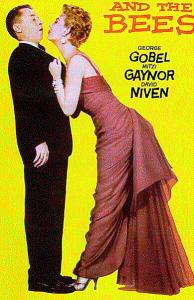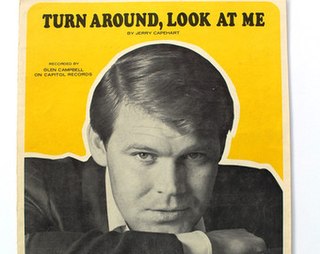"You Always Hurt the One You Love" is a pop standard with lyrics by Allan Roberts and music by Doris Fisher. First recorded by the Mills Brothers, whose recording reached the top of the Billboard charts in 1944, it was also a hit for Sammy Kaye in 1945.
"You Belong to Me" is a popular music ballad from the 1950s. It is well known for its opening line, "See the pyramids along the Nile". The song was published in Hollywood on April 21, 1952, and the most popular version was by Jo Stafford, reaching No. 1 on both the UK and US singles charts.

The Birds and the Bees is a 1956 American screwball comedy film with songs, starring George Gobel, Mitzi Gaynor and David Niven. A remake of Preston Sturges' 1941 film The Lady Eve, which was based on a story by Monckton Hoffe, the film was directed by Norman Taurog and written by Sidney Sheldon. The costumes for the film were designed by Edith Head.
"Make It Easy on Yourself" is a popular song written by Burt Bacharach and Hal David which was initially a hit for Jerry Butler in 1962. The best-known version is the 1965 recording by the Walker Brothers, for whom it was a No. 1 UK and Canadian hit. Dionne Warwick, who made a demo of the song in early 1962, later had a hit with it in 1970.
"Brand New Cadillac" is a 1959 song by Vince Taylor, and was originally released as a B-side. Featured musicians on the released recording were: Joe Moretti (guitars), Lou Brian (piano), Brian Locking (bass) and Brian Bennett (drums). While not successful in the UK, it got a huge surge in popularity in continental Europe, especially the Nordic countries, with acts such as The Renegades and Hep Stars bringing it to number one in Finland and Sweden respectively. Another Swedish act, the Shamrocks brought the song to number one in France.

"Turn Around, Look at Me" is a song written by Jerry Capehart and Glen Campbell, though Campbell is not officially credited.

"You Light Up My Life" is a ballad written by Joseph Brooks, and originally recorded by Kasey Cisyk for the soundtrack album to the 1977 film of the same title. The song was lip synced in the film by its lead actress, Didi Conn. The best-known cover version of the song is a cover by Debby Boone, the daughter of singer Pat Boone. It held the No. 1 position on the Billboard Hot 100 chart for ten consecutive weeks in 1977 and topped Record World magazine's Top 100 Singles Chart for a record 13 weeks.
"You're Nobody till Somebody Loves You" is a popular song written by Russ Morgan, Larry Stock, and James Cavanaugh and published in 1944. The song was first recorded by Morgan and was a hit for him in 1946, reaching the No. 14 spot in the charts. The best known version was Dean Martin's, which was released in 1960 and reissued in 1964.
Jerome Louis "J.J." Jackson is an American soul/R&B singer, songwriter, and arranger. His singing style is as a belter. Jackson best known for the song "But It's Alright", which he co-wrote with Pierre Tubbs. The song was released in 1966 and then re-released in 1969, to chart success on both occasions. The liner notes to his 1967 album, J.J. Jackson, on Calla Records, stated that he weighed 285 pounds.
"Wedding Song (There Is Love)" is a title of a 1971 hit single by Paul Stookey: the song—which Stookey credits to divine inspiration— has since been recorded by many singers (with versions by Petula Clark and Mary MacGregor returning it to the Billboard Hot 100)—and remains a popular choice for performance at weddings.

Jewel Eugene Akens was an American singer and record producer.

"Suspicion" is a 1962 song originally recorded by Elvis Presley written by Doc Pomus and Mort Shuman. It became a major hit in 1964 in a recording by Elvis Presley sound-alike Terry Stafford.
"Morgen" is a popular song (1959), originally performed in German by Croatian singer Ivo Robić and The Song-Masters, accompanied by Bert Kaempfert and his orchestra.

"I'm Gonna Be Warm This Winter" is a 1962 single by Connie Francis, released in that December to peak at #18 on both the Billboard Hot 100 and the Cash Box Top 100. The song reached #22 UK in December 2008 via a remake by Gabriella Cilmi titled "Warm This Winter".
"Romeo" is a 1961 pop song recorded by Petula Clark.

"Where the Boys Are" is a song written by Neil Sedaka and Howard Greenfield for, and first recorded by, Connie Francis as the title track of the 1960 movie by the same name in which she was co-starring.

"Pretty Girls Everywhere" is a song written by Eugene Church and Thomas Williams.
"Return to Me" is a song with music by Carmen Lombardo and lyrics by Danny Di Minno. The song was released in 1958 by Dean Martin. Martin recorded the song again in 1961 for his album Dino: Italian Love Songs.
"Make Love to Me" is a 1954 popular song with words and music written by a larger team than normally is known to collaborate on a song: Bill Norvas, Alan Copeland, and the New Orleans Rhythm Kings, comprising Leon Rappolo, Paul Mares, Ben Pollack, George Brunies, Mel Stitzel, and Walter Melrose. The melody was derived from a 1923 song, "Tin Roof Blues", composed by the New Orleans Rhythm Kings.
Joe Stubbs was an American R&B/soul singer who became the lead singer of four different groups throughout his recording career. He was the younger brother of The Four Tops' lead Levi Stubbs.







